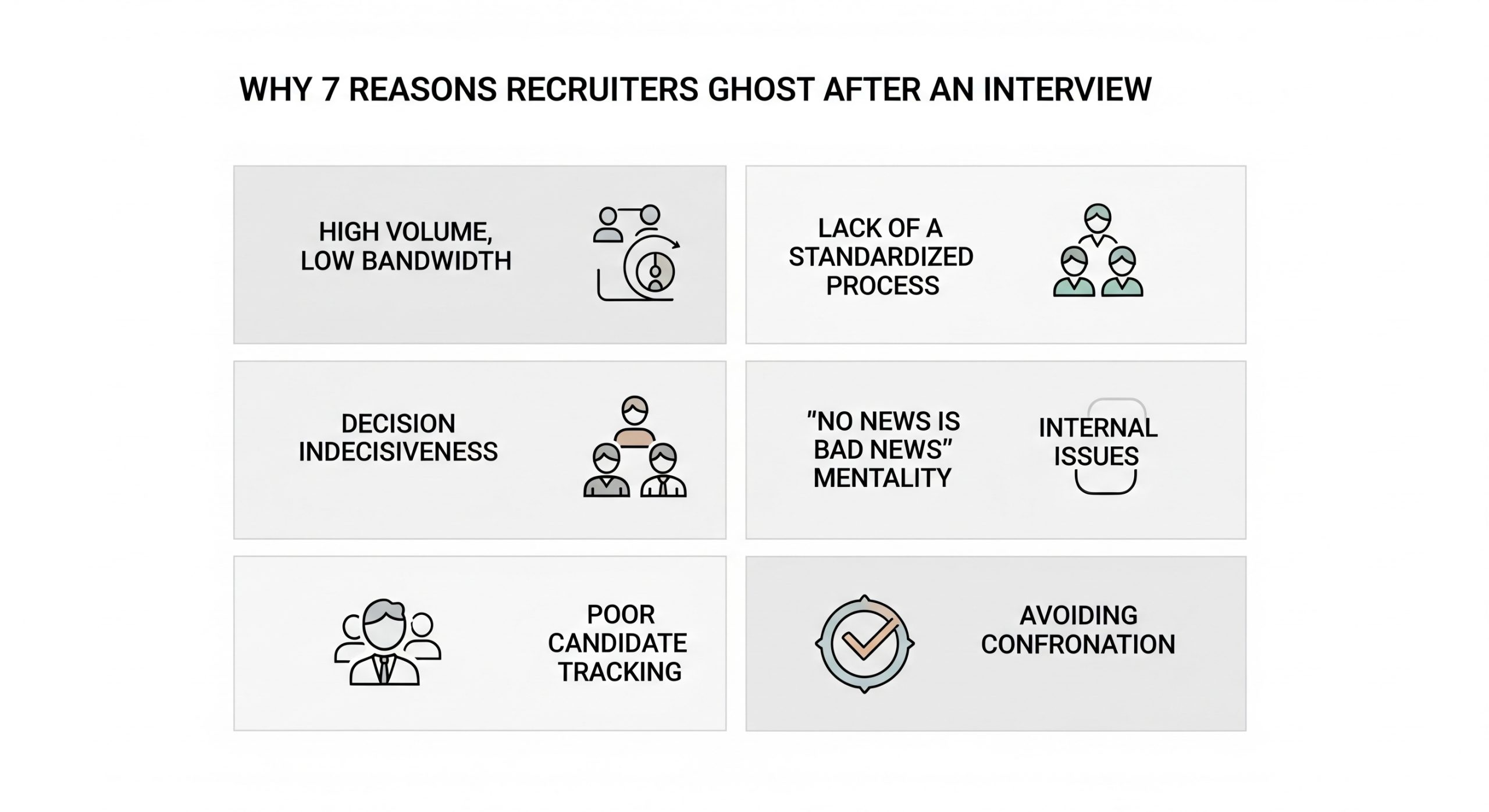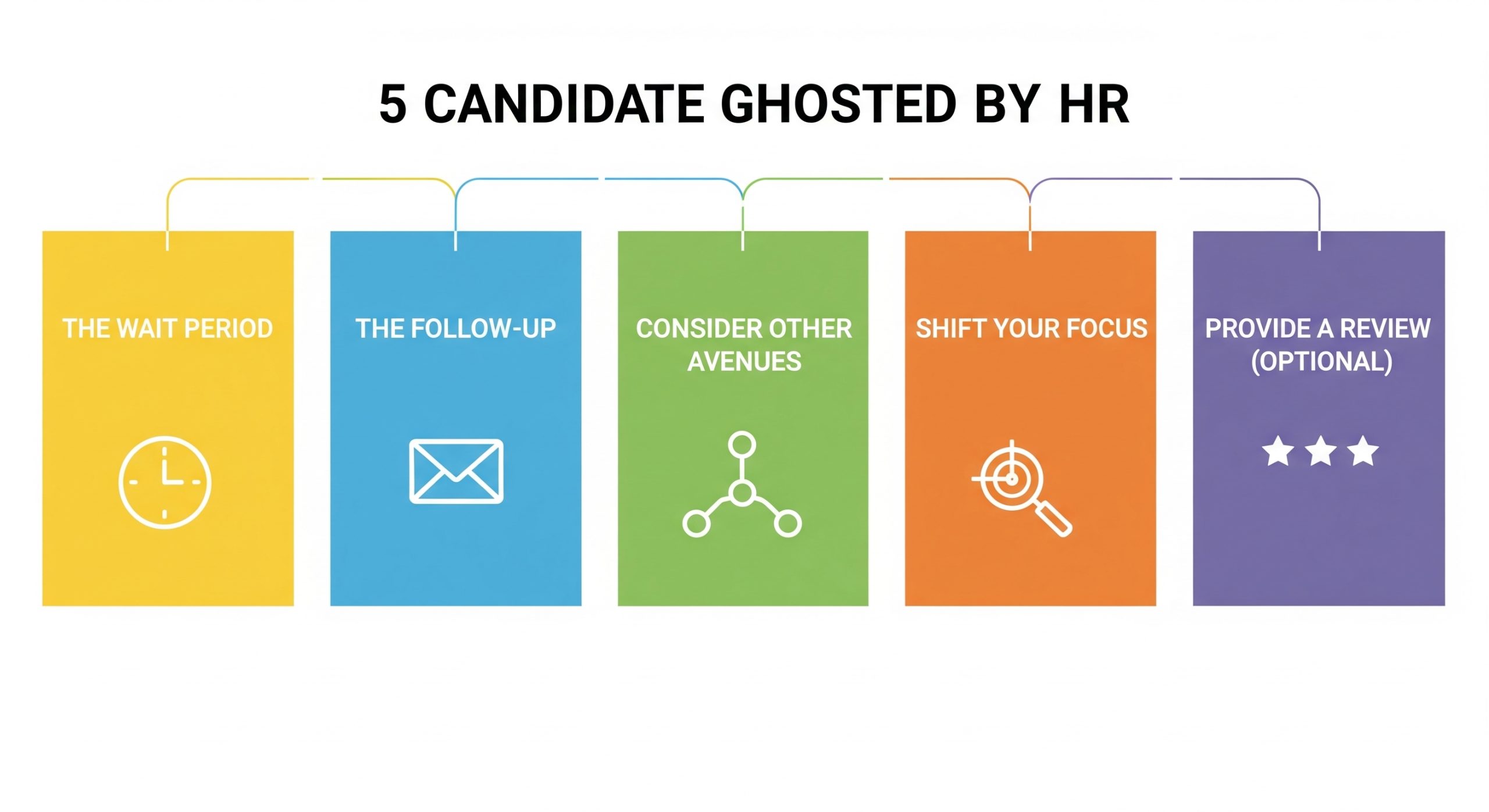A frustrating and emotionally draining phenomenon that candidates frequently encounter in the contemporary job market is “ghosting.” Despite having its roots in dating, the phrase has gained popularity in the workplace, especially during the hiring process. When a hiring manager or recruiter abruptly stops communicating with a candidate without providing an explanation, it’s known as “ghosting.” This leaves the candidate in a state of uncertainty following an interview or a string of productive exchanges. The candidate may become discouraged and feel that their time and effort are being disrespected as a result of this silent treatment.
This in-depth manual explores the realm of HR ghosting, providing a thorough definition, examining the various motivations behind recruiters’ actions, and—above all—offering practical advice on what to do if you are the victim. In order to equip job seekers with the information and techniques they need to deal with this discouraging trend with resilience and confidence, we’ll break it down.
What Is HR Ghosting?
The act of a company or recruiter abruptly and mysteriously ceasing all communication with a job applicant is known as “ghosting” in the context of human resources. This can happen at any point during the hiring process, but it hurts the most when it happens after a candidate has spent a lot of time and effort on project assignments, interviews, or skills tests. The message is conveyed by the company’s complete lack of response to messages, calls, or emails; the candidate is left without a sense of closure, feedback, or their current status.
Traditional hiring procedures, in which a candidate would normally receive a rejection email or phone call, even if the news was disheartening, stand in sharp contrast to this behavior. The trend toward ghosting is primarily a result of a high volume, fast-paced hiring process where efficiency can occasionally take precedence over candidate experience.
The psychological impact of HR ghosting is significant. For candidates, it can lead to:
- Confusion and Self-Doubt: Without feedback, a candidate might question their performance, skills, or even their personal worth. Was it something they said? Did they fail the interview? The lack of information fuels uncertainty.
- Frustration and Anger: Investing time and hope in a potential job, only to be met with silence, is a major source of frustration. It can feel like a profound lack of respect.
- Loss of Motivation: Repeated ghosting can make candidates cynical about the job search, dampening their enthusiasm and making it harder to put in the effort for future applications.
- Reputation Damage: While companies may think ghosting is an easy way out, it can seriously damage their reputation. Negative reviews on platforms like Glassdoor or LinkedIn can deter top talent from applying in the future, ultimately harming their employer brand.
In essence, HR ghosting is more than just a lack of communication—it is a breakdown of professional courtesy and a symptom of a system that, at times, fails to recognize the human behind the resume.
Why Do Recruiters Ghost After an Interview?
For a candidate, being ghosted after a promising interview can feel personal. They often wonder if they did something wrong or were not good enough. However, the reasons for ghosting are typically less about the candidate’s performance and more about internal issues within the hiring company.

1. High Volume, Low Bandwidth: Recruiters often manage dozens, if not hundreds, of candidates at once. When a position is filled, or a hiring process is canceled, they may not have the time or resources to send personalized rejection messages to every candidate who didn’t make the final cut. This is particularly true for roles that attract a large volume of applications.
2. Lack of a Standardized Process: Many companies, especially smaller ones or those without a dedicated HR department, may not have a formal process for handling rejections. This lack of a system can lead to a disorganized approach where recruiters simply move on to the next task without closing the loop with all candidates.
3. Decision Indecisiveness: Sometimes, a company might be uncertain about a hire. A hiring manager might not be fully committed to a candidate but also doesn’t want to close the door completely, in case their first choice doesn’t work out. In this scenario, they may ghost the candidate as a way to keep them “on the back burner.”
4. The “No News is Bad News” Mentality: Some recruiters operate under the outdated and unprofessional assumption that candidates understand that if they don’t hear back, it means they didn’t get the job. They may not see the need for a formal rejection, viewing it as an unnecessary step.
5. Internal Issues and Reorganization: A company’s hiring needs can change overnight. A position might be put on hold, restructured, or eliminated entirely due to budget cuts or internal reorganization. In these situations, the recruiter may not have the information or authority to communicate the status update, and thus, they go silent.
6. Poor Candidate Tracking Systems: In some cases, recruiters simply lose track of candidates. A poorly managed Applicant Tracking System (ATS) or a disorganized spreadsheet can lead to candidates being forgotten as the process moves forward.
7. Avoiding Confrontation: For some, delivering bad news is uncomfortable. Rather than facing a potentially difficult conversation or a follow-up email from a disappointed candidate, some recruiters choose to avoid the interaction altogether.
It’s important for candidates to recognize that ghosting is a systemic issue within the company, not a personal reflection of their skills or abilities. The responsibility for professional communication lies with the employer, not the job seeker.
What to Do When Ghosted by HR?
Being ghosted is frustrating, but it doesn’t mean you should give up. Having a clear plan of action can help you regain a sense of control and move forward constructively. Here’s a step-by-step guide on how to handle the situation.

Step 1: The Wait Period
First, give it a reasonable amount of time. The hiring process can be slow and unpredictable, and a delay doesn’t automatically mean you’ve been ghosted. A good rule of thumb is to wait at least a week after a promised follow-up date. If no date was given, wait a week after your last contact. This waiting period ensures you aren’t over-reacting and gives the recruiter time to get back to you, especially if they are legitimately busy.
Step 2: The Follow-Up
After the waiting period, send a polite and professional follow-up email. This email should be brief, respectful of their time, and reiterate your interest in the position. Do not sound accusatory or angry. A simple, to-the-point message is most effective.
Example Follow-Up Email:
Subject: Following up on [Job Title] Interview
Dear [Recruiter’s Name],
I hope this email finds you well. I am writing to follow up on the [Job Title] interview I had on [Date of Interview]. I thoroughly enjoyed our conversation and am very enthusiastic about the opportunity to [mention something specific you liked about the job or company].
I was wondering if there have been any updates on the position. Thank you again for your time and consideration. I look forward to hearing from you.
Best regards, [Your Name]
If you don’t hear back from this email, you can send one more follow-up a week later, but after that, it’s generally best to let it go.
Step 3: Consider Other Avenues of Communication
If you’re still determined to get an answer, you can try contacting a different person at the company. This could be a hiring manager you interviewed with or another member of the recruitment team. Use your best judgment here; you don’t want to come across as desperate or harassing. A simple, polite message on LinkedIn can be an effective way to get an update.
Step 4: Shift Your Focus
The most important step is to stop dwelling on the ghosting and re-focus your energy. Ghosting is not a reflection of your worth as a professional. Once you’ve made a reasonable effort to follow up, assume the position is no longer an option and move on to other opportunities. Continue your job search, apply for new positions, and network with other professionals.
Step 5: Provide a Review (Optional)
If you feel strongly that the company’s behavior was unprofessional, you can leave an anonymous review on an employer review site like Glassdoor or on professional forums. This is a powerful way to hold companies accountable and warn other job seekers. Be factual and professional in your review; an emotional rant is less effective and may hurt your own credibility.
HR Ghosting in a Broader Context
HR ghosting is a sign of a bigger problem in the contemporary workplace, not just a small annoyance. It illustrates how the hiring process has become less personalized, with technology and volume-based metrics occasionally taking precedence over the value of respect and human connection.
Employers view ghosting as a dangerous tactic. It may result in a tarnished employer brand, which will make it more difficult to draw in top talent later on. A company’s reputation for treating applicants with dignity can be a big plus in a competitive market. Top applicants who are ghosted might even post about their unpleasant experiences online, which could deter other people from applying.
The increase in HR ghosting has made the job search more difficult for applicants. It calls for a different kind of resilience, the professionalism to keep going with a positive outlook, and the capacity to let go of an opportunity without closure.
For many job seekers, HR ghosting is an annoying reality, but it does not represent your abilities or potential. Navigating today’s job market requires knowing what it is, why it occurs, and how to react appropriately. You can effectively overcome the silent treatment by remaining professional, following up as needed, and refocusing on new opportunities. Keep in mind that while landing a fantastic new position is the best-case scenario, the most crucial result is that you remain positive and confident throughout the process.
Frequently Asked Questions
Q1. Should I keep applying for jobs at a company that has ghosted me before?
You should use your best judgment. While it’s possible a different department or recruiter will be more professional, it’s also a sign of a company’s overall culture. If you really want to work there, you can try, but be aware of the potential for a repeat experience.
Q2. Is it ever okay to be angry at a recruiter who ghosts me?
It’s natural to feel frustrated and angry. However, it’s important not to let those emotions dictate your response. Keep your communication professional, as you never know who you might encounter again in your career.
Q3. How long should I wait before assuming I’ve been ghosted?
A good rule of thumb is to wait at least one week after your last communication or after the date the recruiter said they would get back to you.
Q4. Can HR ghosting be illegal?
While unprofessional and disrespectful, HR ghosting is not illegal in most jurisdictions. There is no legal obligation for an employer to notify a candidate of a rejection.
Q5. How can I protect myself from being ghosted in the future?
During the interview, ask about the hiring timeline and process. Ask the recruiter when you can expect to hear back and if it’s okay to follow up. This sets a clear expectation and makes it easier to know when to send a follow-up email.

One thought on “Ghosting in Recruitment: A Candidate’s Guide to Dealing with the Silent Treatment”